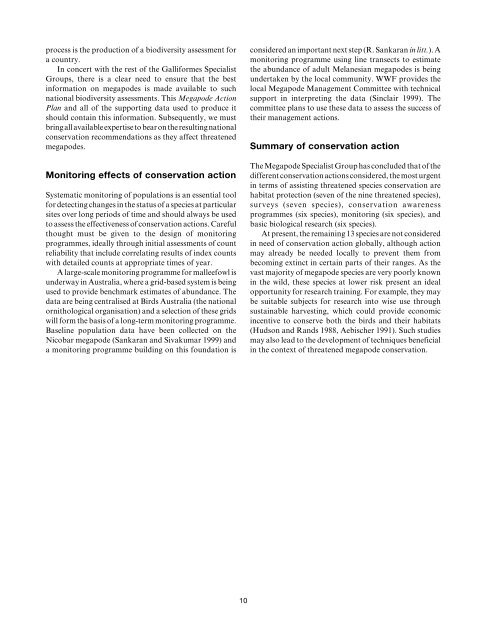Megapodes: Status Survey and Conservation Action Plan ... - IUCN
Megapodes: Status Survey and Conservation Action Plan ... - IUCN
Megapodes: Status Survey and Conservation Action Plan ... - IUCN
Create successful ePaper yourself
Turn your PDF publications into a flip-book with our unique Google optimized e-Paper software.
process is the production of a biodiversity assessment for<br />
a country.<br />
In concert with the rest of the Galliformes Specialist<br />
Groups, there is a clear need to ensure that the best<br />
information on megapodes is made available to such<br />
national biodiversity assessments. This Megapode <strong>Action</strong><br />
<strong>Plan</strong> <strong>and</strong> all of the supporting data used to produce it<br />
should contain this information. Subsequently, we must<br />
bring all available expertise to bear on the resulting national<br />
conservation recommendations as they affect threatened<br />
megapodes.<br />
Monitoring effects of conservation action<br />
Systematic monitoring of populations is an essential tool<br />
for detecting changes in the status of a species at particular<br />
sites over long periods of time <strong>and</strong> should always be used<br />
to assess the effectiveness of conservation actions. Careful<br />
thought must be given to the design of monitoring<br />
programmes, ideally through initial assessments of count<br />
reliability that include correlating results of index counts<br />
with detailed counts at appropriate times of year.<br />
A large-scale monitoring programme for malleefowl is<br />
underway in Australia, where a grid-based system is being<br />
used to provide benchmark estimates of abundance. The<br />
data are being centralised at Birds Australia (the national<br />
ornithological organisation) <strong>and</strong> a selection of these grids<br />
will form the basis of a long-term monitoring programme.<br />
Baseline population data have been collected on the<br />
Nicobar megapode (Sankaran <strong>and</strong> Sivakumar 1999) <strong>and</strong><br />
a monitoring programme building on this foundation is<br />
considered an important next step (R. Sankaran in litt.). A<br />
monitoring programme using line transects to estimate<br />
the abundance of adult Melanesian megapodes is being<br />
undertaken by the local community. WWF provides the<br />
local Megapode Management Committee with technical<br />
support in interpreting the data (Sinclair 1999). The<br />
committee plans to use these data to assess the success of<br />
their management actions.<br />
Summary of conservation action<br />
The Megapode Specialist Group has concluded that of the<br />
different conservation actions considered, the most urgent<br />
in terms of assisting threatened species conservation are<br />
habitat protection (seven of the nine threatened species),<br />
surveys (seven species), conservation awareness<br />
programmes (six species), monitoring (six species), <strong>and</strong><br />
basic biological research (six species).<br />
At present, the remaining 13 species are not considered<br />
in need of conservation action globally, although action<br />
may already be needed locally to prevent them from<br />
becoming extinct in certain parts of their ranges. As the<br />
vast majority of megapode species are very poorly known<br />
in the wild, these species at lower risk present an ideal<br />
opportunity for research training. For example, they may<br />
be suitable subjects for research into wise use through<br />
sustainable harvesting, which could provide economic<br />
incentive to conserve both the birds <strong>and</strong> their habitats<br />
(Hudson <strong>and</strong> R<strong>and</strong>s 1988, Aebischer 1991). Such studies<br />
may also lead to the development of techniques beneficial<br />
in the context of threatened megapode conservation.<br />
10
















